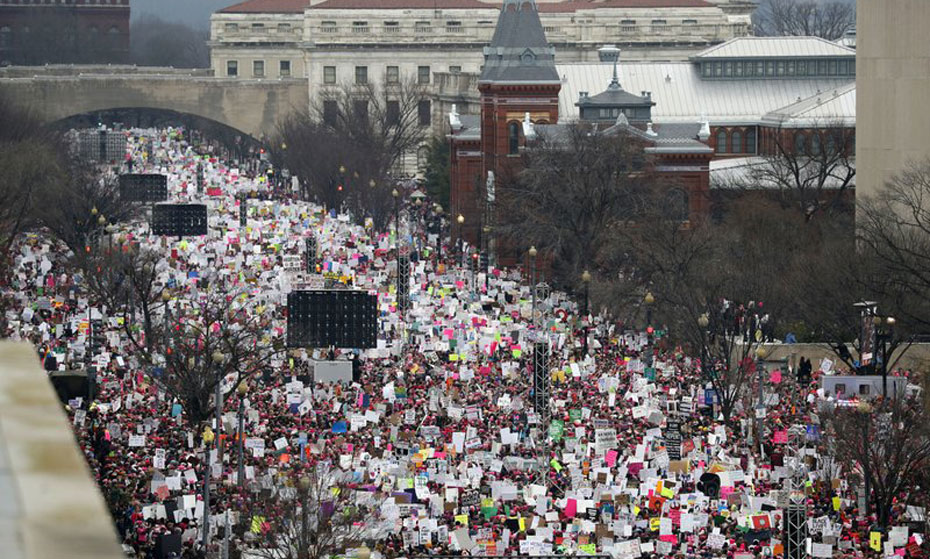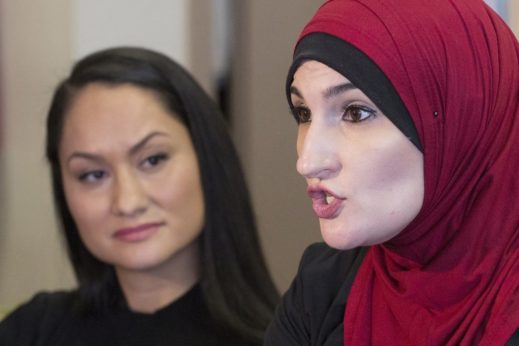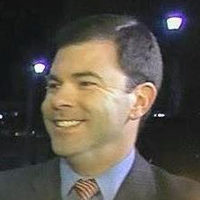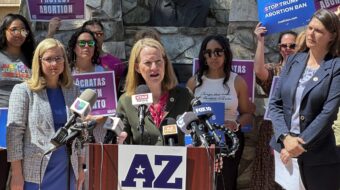
The idea first came to Teresa Shook, a Hawaii retiree, in the hours after Donald Trump was elected. Perhaps, she suggested to a few friends on Facebook, women could march on Washington to show the depth of their resistance. Two days later, New York fashion designer Bob Bland joined the call for action with her own message.
“Who wants to join me?!?” she asked.
Turns out, a whole lot of people did.
The astounding sea of women in bright pink “pussy hats”—at least half a million in Washington alone, and many more in hundreds of marches elsewhere—became the face of the resistance to Trump and his agenda. It inspired thousands of women to do something they’d never done before: explore a run for political office. The jolt of energy, and unity, also laid the cultural groundwork, many believe, for the “#MeToo” phenomenon to catch fire later in the year, calling powerful men to account for sexual misconduct.
Now, the loosely defined “resistance movement”—a network of groups around the nation, with men and women raising money and knocking on doors and supporting hundreds of progressive candidates—is setting its sights on the 2018 midterm elections, hoping to deal the White House and the all-GOP government in Washington a permanent setback.
Next stop for the Women’s March organizers: Las Vegas. Rather than returning to Washington, they’re holding a “Power to the Polls” rally in the Nevada city on Sunday, launching a voter registration tour and putting out the message that the next step is all about votes. “The year 2018 is really where the rubber meets the road,” says Linda Sarsour, one of the original organizers along with Bland.
A year on, Sarsour says what she’s proudest of is that “the march set the tone for the resistance… if you look at so many of the fights that happened this year, whether it be around health care, the tax bill, the Dreamers, if you really look, it was led by women.”
The group pointedly decided to spend the anniversary in a battleground state, won narrowly by Hillary Clinton in November. “If it can happen in Nevada, it can happen anywhere,” she says. Nevada is also, she says, at the crossroads of crucial issues like immigration and gun control; in October, it suffered the deadliest mass shooting in modern U.S. history.
Fueling these electoral ambitions is an infusion of first-time women candidates. Emily’s List, which helps Democratic, pro-abortion rights candidates run for office, has proudly kept a tally all year of women who’ve expressed interest in running, via its website. More than 26,000 women have done so since the women’s march, compared to only 920 in the two years before, says its president, Stephanie Schriock. The group has been buoyed by recent state legislative victories in Virginia—where it focused on 16 races, and its candidates won 13 of them—and by this week’s victories of two Wisconsin candidates.
“We’re still recruiting hundreds of candidates, until the last filing deadline,” Schriock says. “There’s a decade of candidates coming.”
Debbie Walsh of Rutgers University, who’s been studying women in politics for 35 years, says she had initially feared that women would be discouraged from seeking office by Clinton’s defeat. Instead, she says, “there was this instantaneous response that stemmed from this visceral need to take back some control, assert some power.”
It’s a unique moment for women on the left, she says: “The kind of focus, attention, activism—I can’t remember a moment quite like this.”
One woman who’s already taken the plunge is Lisa Mandelblatt, a former attorney in Westfield, New Jersey who’s running for U.S. Congress, trying to unseat a Republican incumbent in November. Like so many, she made her decision to run at last year’s women’s march—“truly a life-changing event.”
Mandelblatt, 53, will be marking the anniversary at two marches this weekend in her home state. She says she’s been thrilled to see that “the resistance is still being fueled by women. Men are helping it along, but I’m so excited to see that it’s really being spearheaded by women activists.”
The post-inauguration marches and this year’s encores—not just the main event in Las Vegas, but in gatherings of varying sizes across the country and overseas—bookend a year of activism that has helped deliver electoral victories for Democrats. They’ve won local offices, made huge gains in the Virginia General Assembly, and even claimed a U.S. Senate seat in conservative Alabama.
Plenty of self-identified progressives have lost, too. Still, the resistance sees itself as a big success.
“I hate to use a term like silver lining, because the damage from this administration has already been so great,” says Leah Greenberg, who co-founded the resistance group Indivisible with her husband, Ezra Levin. But, she says, “We have seen a pretty incredible wave of grassroots resistance and organizing that we hope to maintain for the long haul…and it’s activists DOING something, not just Facebooking.”
The movement ranges from new or burgeoning powers like Indivisible and the Working Families Party to longtime staples like Emily’s List, ActBlue, and MoveOn.org. The groups have combined to raise tens of millions of dollars and organized on behalf of more than 1,000 candidates in 2017. By WFP’s count, two-thirds of its endorsed candidates won.
Resistance-backed candidates have won mayor’s seats in New Orleans, Louisiana; Jackson Mississippi; and Birmingham, Alabama—Democratic-run cities in Republican Deep South states.
At first glance, that means one Democratic mayor—though the seats are officially nonpartisan—replacing another. But in each case, the winner represents a new generation of activists. In Jackson, Mayor Chuckwe Lumumba, 34, says he wants to make the capital of Mississippi “the most radical city on the planet.”
The resistance has drawn comparisons to the tea party movement, but some leaders of that uprising on the right don’t necessarily consider their left-leaning brethren political equals. Amy Kremer, a leader of the Tea Party Express until 2014, is skeptical of predictions of a “Democratic wave” commensurate to what the tea party helped Republicans pull off in 2010.
“They have to make it about policy, not just the man,” says Kremer.

But Indivisible’s Levin says an underappreciated part of the movement is that it reaches everywhere, even deeply Republican areas. That means empowering people who have “never had a progressive ecosystem” around them, while also enabling frustrated independents or conservatives.
Not all of the candidacies fueled by the resistance were successful. In New Jersey, first-time candidate Christine Lui Chen launched a State Senate campaign, full of hope and energy. “I can’t tell you how many doors I knocked on,” she says.
She lost. Even more disappointing, she says, was how almost all incumbents won their legislative races “in a state on an economic precipice.” It left her feeling deeply frustrated with what she calls an entrenched system favoring the establishment. “I wanted to challenge the system,” she says.
Elizabeth Guzman had a happier experience. She recalls launching her campaign for Virginia’s legislature in October 2016 thinking she’d join a flood of women serving alongside President Hillary Clinton. But the Peru native, who came to the United States as a “bilingual secretary” and now has two master’s degrees, says she quickly shifted her focus after Trump’s victory.
“I had so much support from within my district and nationwide. They came and knocked on doors, raised money, sent postcards, made calls.”
Guzman claimed a northern Virginia House of Delegates district that had been in Republican hands for more than a decade.
“Absolutely, I feel part of the movement,” she says.
Noveck reported from New York, and Barrow reported from Atlanta. This story comes from the Associated Press.













Comments